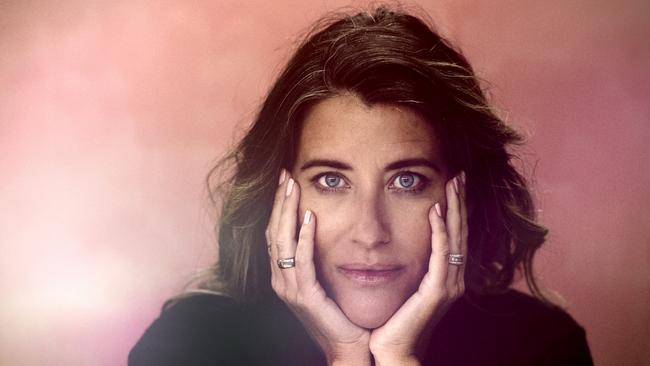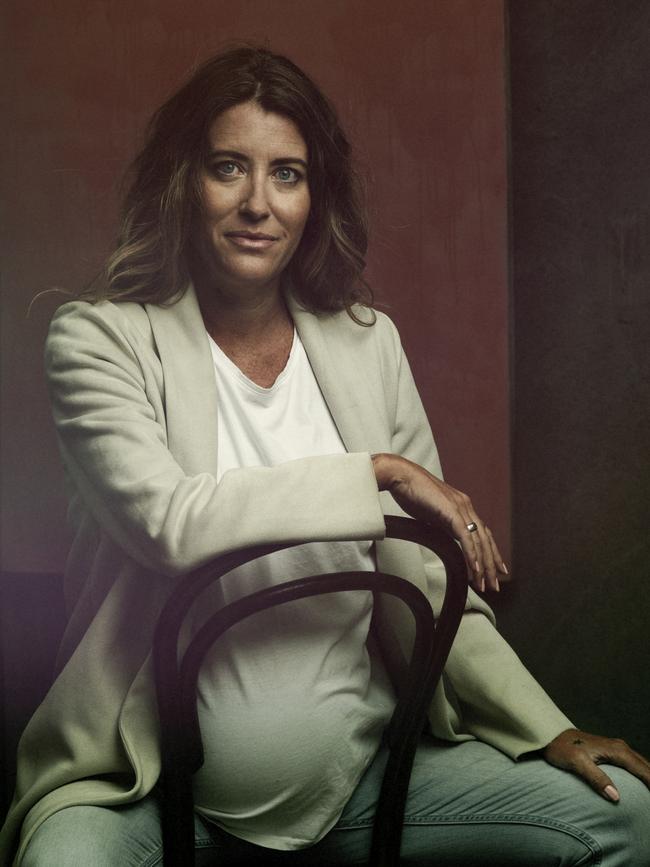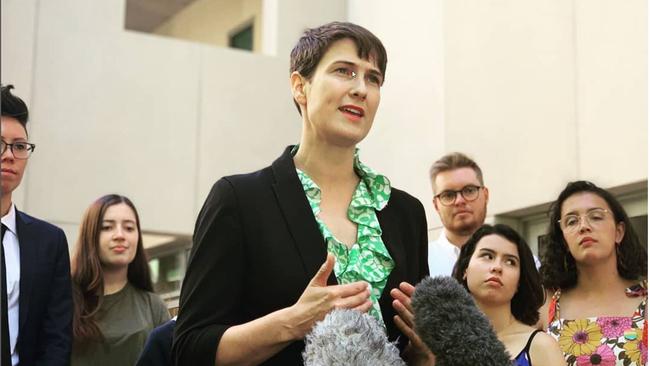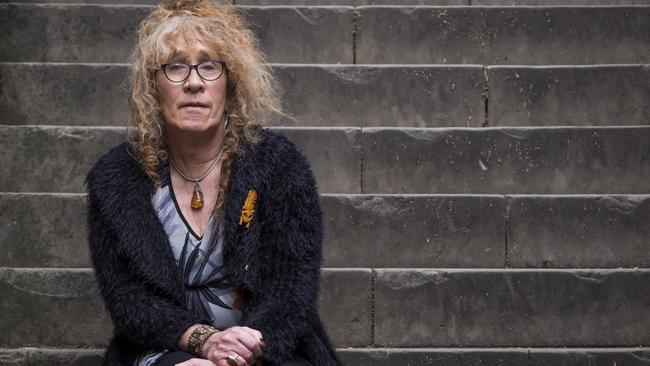Challenge to women-only app Giggle was no laughing matter
She created an app intended as a safe space for women to share their experiences away from death threats and toxic male behaviour. Little did Sall Grover know the battle she would face.

The warm Gold Coast sun is beaming on soon-to-be mum Sall Grover but there’s nothing sunny about her mood this morning. As she talks about a discrimination complaint against her business, a female-only social networking platform, she struggles to contain her rage. In the final weeks of her pregnancy she should be nesting and preparing for the birth; instead she’s gearing up for a battle that will have far-reaching implications not only for her, she believes, but for all women.
It all seemed so simple when she established the free app Giggle in 2019 as a female-only space where women can chat about issues, promote their business, find accommodation, network and share their intimate thoughts with like-minded users. The 37-year-old grew up on the Gold Coast, studying film, journalism and philosophy at Bond University before leaving Australia to fulfil her dream of being a romcom screenwriter in Hollywood. A decade later, after witnessing first-hand misogyny and sexual abuse towards women in Hollywood, she returned home and created the app as a means of therapy for herself and others. Anticipating that some men might try to crash the platform, she took steps to ensure that it could only be accessed by women. “When they [men] decide to really go after us, which they do every few weeks or months, they do it by the high thousands in a short period of time.”
So to access Giggle, new members are required to upload a photograph to be verified through facial recognition software to confirm they are female. Grover says it is about 94 per cent accurate and women rarely run into problems; if they do it is often only due to a blurry or highly pixelated image. “If Giggle didn’t have gatekeeping to create a female-only platform, it wouldn’t be one. It’s as simple as that. An onboarding selfie is the easiest, most effective way to do this,” she says. The platform soon grew and now connects 20,000 women in 88 countries. “We have women in countries like Saudi Arabia or Orthodox Jewish women where female-only spaces are incredibly important. We have women who are recovering and dealing with trauma, and the space has significance to them in their healing,” she explains.
Just weeks after going live in the testing phase, Giggle found itself dealing with the first online attack. The security settings weren’t in full effect and some new users left reviews accusing it of being transphobic. Grover was shocked; she never imagined her efforts to create a safe space for women would land her at the centre of a gender war, labelled a TERF (trans-exclusionary radical feminist) and receive death threats.

“It’s been hell,” she says. “It’s terrifying and I’ve had to navigate it all through nine months of pregnancy. I created a social network for women, myself included, where we can relax on the internet away from death threats and toxic male behaviour.” While always outspoken about women’s rights, she never considered herself an activist. And she still doesn’t.
Grover says that during the app development phase it was envisaged that transwomen would be able to contact Giggle if they wished to join, “because honestly we thought we’d be dealing with a minuscule amount of people in this context”. However, following the early attacks, this idea was dropped. Worried that some men were claiming to be women to gain access, “we changed the Giggle policy to strictly female-only out of necessity”. But by then, the negative comments had stuck. “We did ad testing on Facebook and Instagram, and they got banned for hateful content. Google ads take our reviews into account and because we’ve been attacked our ads would be pushed to the bottom of the pile,” she explains. “We wanted to do equity crowd funding, which would allow women to have ownership in a start-up and have investment in the financial world. No equity crowd funding company would work with us, saying the trans issue was like an open wound.”
Despite these setbacks, Grover remained steadfast that the app should be solely for biological women. So, in September last year, when manually checking the screening process, she saw a photo of a person she took to be a man who’d got through the screening and removed the profile. “I thought nothing of it because we’d removed men before and since,” she says.
Realising she’d been removed, this person, Roxanne Tickle, emailed Giggle to confirm she was a transgender woman. Grover didn’t reply to the email; she says it’s impossible to respond to every email. The following month she says she received a text on her personal phone from Tickle, saying she wanted to talk about joining Giggle. “I froze. No other user had ever contacted me on my phone,” she recalls. Then on January 20 this year Grover received a discrimination complaint made to the Australian Human Rights Commission by Tickle. The following day Tickle tweeted that she would be incurring quite a few expenses for her advocacy work this year and needed funding. On her Ko-fi page (a platform for collecting donations) she says: “I spend a lot of my ‘spare’ time and expend a lot of emotional energy drawing attention to our (already!) legally protected rights and helping cis people at least try to understand what it means to be trans.”
In her complaint Tickle stated she believed she was being discriminated against by Giggle because she is a transgender woman. “The app provider appears to not recognise transgender women as female. I am legally permitted to identify as female.” Tickle called upon Giggle management to undergo education on sex, gender and gender identity and she wanted full access to the app for herself and other people identifying as female.
Grover refused to give ground. She says that, based on what Tickle was seeking, conciliation would have resulted in her business and the space she’s created for women around the world being destroyed. “Roxanne wants all males identifying as women to be allowed on, and any offensive comments to transwomen made on the app moderated,” she says. “And for me to go to sex and gender education. I am educated on sex and gender; I just don’t agree with their ideology. I am never going to agree with those things. It renders my company useless and takes away my own human rights.”
Unable to reach conciliation, Tickle took the matter to the Federal Court alleging unlawful discrimination under the AustralianHuman Rights Commission Act 1986. When she was served the papers, a heavily pregnant Grover says she burst into tears. “I felt shattered. My first thought was, the first year or two of my daughter’s life will be spent doing all of this,” she says. “I feel like I’m in the midst of a nervous breakdown, like I’m under surveillance. When we created the app we did not think we’d be fighting something like this that could be a landmark legislative case for Australia.”
In the court documents Tickle said that although her sex at birth was male, she has had her birth certificate reissued to say she is a female and a letter from her physician confirming her gender is female. She claimed discrimination in relation to comments from Grover “that she considered transgender women, including the applicant, to be male” and sought damages, an apology and full access to the app. “I believe Giggle and Sall Grover have decided in error that I am male and have declined to grant me full access to the app.”
Last week, on the eve of the first mention in court, Tickle, 53, suddenly dropped the case. She declined to comment on the reasons. For Grover, it’s small victory – she’s concerned that other cases may be forthcoming against Giggle. “But in a way the scariest part is not individuals coming after you but that institutions like the Australian Human Rights Commission will tell a citizen that they need to have gender identity education. That is something that should concern everyone.”

Christine Quinan, a lecturer in Gender Studies at the University of Melbourne, says the issue of allowing transwomen into women’s spaces is charged and contentious. Quinan believes the Automatic Gender Recognition technology used by Giggle relies on an outmoded understanding of gender and reinforces marginalisation of trans people, preventing them from fully participating in society. “We cannot underestimate the impacts on health and wellbeing when trans and gender diverse people are continually asked to prove their legitimacy and to prove their very existence,” they said. “While biometrics and statistical surveillance supposedly provide proof that we are who we say we are, that burden of proof is unduly placed on those who do not ‘match’ expected norms, facilitating exclusionary, rather than inclusionary goals.”
Equality Australia CEO Anna Brown says discrimination laws exist to ensure everyone has equal access to participate in public life on equal terms. “Women who are trans experience extraordinary rates of abuse, sexual assault and discrimination – often at the hands of men,” Brown says. “The resulting social isolation drives some of the worst mental health outcomes in the community, with research revealing that almost one in two transgender people have attempted suicide.” She says service owners and providers including online platforms and apps have the responsibility to ensure people can access their service without discrimination. “Products marketed for women must be inclusive of all women.”

Having experienced exclusion and discrimination first-hand, Tasmanian trans advocate Martine Delaney has spent 20 years fighting for trans rights and legislative reform. She feels trans people are being sent a clear message they are not welcome and are being denied access to crucial parts of life, including the ability to connect. “Giggle seems to be saying you are not welcome because our view is you don’t belong in this community despite what the law may say,” Delaney explains. “It is saying we are going to put a chromosome line in the sand, and it doesn’t matter who you are as an individual and how you conduct yourself, but if you are trans you are not welcome here. So, it cannot be anything but discriminatory. It’s a damaging message for people to get and the trans community is probably one of the most marginalised people already. It assumes all transwomen are unsafe. It assumes all cis women are safe.”
Delaney believes Giggle should have a system that allows transwomen access but not males and that if the inclusion of transwomen on the app offends some women, then they have the ability to remove themselves. While she praised Tickle for bringing the now discontinued federal court action, she said she had “mixed feelings” about it. “In the current climate, it gives more ammunition to exclude trans people,” she says. “It is not helped by trans activists giving Sall a hard time. Attacking is not of any real value.”
Grover’s lawyer Anna Kerr, principal solicitor at the Feminist Legal Clinic, says any legal challenge to the app would go to the heart of defining what is a woman and that the implications would be far-reaching. Kerr says the Commonwealth Sex Discrimination Act 1984 allows for “special measures” to advance women’s substantive equality and provides for the exclusion of males where it is reasonable in all circumstances. However, state-based laws, which she says conflate the concepts of biological sex and socially constructed gender identity, enable males to claim to be “legally female” and thereby render these Commonwealth provisions effectively inoperable.
Kara Dansky is a US lawyer, women’s rights campaigner and author of the book The Abolition of Sex: How the ‘Transgender’ Agenda Harms Women and Girls. Like Kerr, Dansky fears women are on the brink of losing hard-fought rights and that Australia is moving down the US path. “The Biden administration has redefined the word sex to include gender identity throughout US Federal administrative law,” Dansky says. “All of Biden’s orders on this topic are currently subject to federal litigation. Nonetheless US Federal agencies are proceeding to annihilate women’s rights at the altar of gender identity. “It ought to be universally understood that women ought to have rights to our opinion and assembly without men,” she adds.
Grover has been bolstered by the support and insists she and Giggle are not anti transgender. (Giggle does allow trans men – women who identify as men – on the platform.) “I don’t care if you want to identify as a woman and live your life that way, I only care if you want to come into a female space,” she says. “I am not a gender feminist. I want no labels. I am just a woman.”
Grover says she is now regularly trolled online. “For the most part I don’t take it personally anymore, although there are some days that are harder than others. The trolling of women online by men is why we started a social network where that is not possible. We created this app for women, and I have spent two and half years, every day having to think about men.”
If further action is launched against Grover, how far is she prepared to take it? “We will go as far as we have to go. We have to go with what is right. Having found out that I’m going to have a daughter during this whole process has only made the fight more personal,” she adds. “It’s my job to protect her and part of that is protecting her rights. I won’t stop fighting until I know for sure that she can go to a change room or Girl Guides or use a female-only app and know it is truly for females.”
This is an updated version of the print story, which went to press before Tickle discontinued her Federal court case.

To join the conversation, please log in. Don't have an account? Register
Join the conversation, you are commenting as Logout